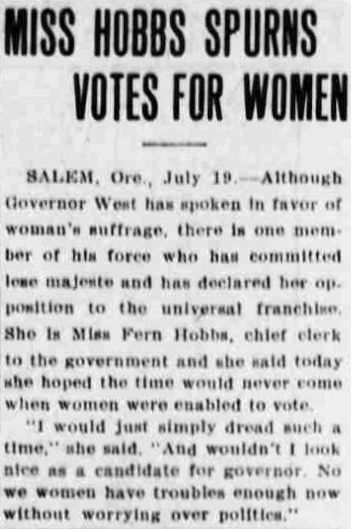July 1911: The Fern Hobbs Enigma
On July 19, 1911, less than two months after the formal opening of the 1912 woman suffrage campaign in Oregon, the Medford Mail Tribune reported that Fern Hobbs, chief clerk for Oregon Governor Oswald West, “hoped the time would never come when women were enabled to vote.” Hobbs “would simply dread such a time,” she told reporters, “And wouldn’t I look nice as a candidate for governor. No we women have troubles enough now without worrying over politics.”
Hobbs opposed votes for women yet her boss, Governor West, endorsed it, and would play a significant role in the successful 1912 campaign.

“Miss Hobbs Spurns Votes for Women,” Medford Mail Tribune, July 19, 1911, 6.
Yet as we learn from the excellent Oregon Encyclopedia biography of Fern Hobbs by Gary Dielman and John de Ferrari, she was a woman whom we might expect to be a strong supporter of woman suffrage.
Hobbs attended Willamette Law school while working as chief clerk for Governor West and, when she received her law degree in 1913, he appointed her his private secretary at an unprecedented salary of $3,000. She worked with federal officials in Washington, D.C., to settle Oregon land issues, was West’s emissary to Copperfield in Baker County and brought his declaration of martial law there in 1914, and served on the Oregon Industrial Accident Commission. During the First World War she served in France with the Red Cross and after the war with the Y.M.C.A. and the U.S. Army of Occupation in Germany. She was a longtime secretary to the business manager of the Oregon Journal.
Yet as Dielman and de Ferrari note, Hobbs “was a symbol of what Oregon women could accomplish” but while “an ardent feminist in her beliefs, Hobbs did not actively participate in the women’s suffrage movement.”
What are we to make of the Fern Hobbs enigma? Her story certainly lets us know that the quest for votes for women was not characterized by a simple divide between active supporters who favored women’s rights and opponents who believed that women should not be educated or employed. It also suggests that the vote, while very important to women’s full citizenship, was not and is not the only factor in achieving equality and empowerment.
It also would be most instructive to know whether Fern Hobbs changed her mind about the importance of voting after the successful 1912 campaign.
Visit the Oregon Encyclopedia entry for Hobbs by Gary Dielman and John de Ferrari to learn more about her life and to view the spectacular images courtesy of de Ferrari.
We in Oregon have an incredible new tool available to us—the Oregon Digital Newspaper Program. Karen Estlund, Director, and Project Manager Jason Stone, supervise a staff who are digitizing Oregon newspapers so that they are searchable on the web. I retrieved the Medford Mail Tribune article featured this month from the project site. Thanks Jason!
—Kimberly Jensen
Want to read more articles from Oregon suffrage campaigns? Click here
Permalink

